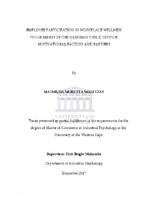Employee participation in workplace wellness programmes in the Namibian public service: Motivational factors and barriers
Abstract
A typical workplace is likely to be non-existent in the absence of its human resources.
Thus, human capital is generally an asset to most organisations. This is why it is
important that employers play an active part in improving and maintaining the
wellbeing of its most valued asset, its employees. The employee wellness programme
is an intervention designed to serve a preventative and curative role concerning the
wellbeing of employees and more organisations realises its value. However,
employees and employers face various challenges when it comes to the participation
of employees in these programmes. The objectives of this study was to determine the factors that motivates employees to
participate in workplace wellness programmes as well as the barriers to employee
participation in workplace wellness programmes in the Namibian public service. The
researcher intended to uncover the personal views and experiences of public service
employees pertaining to the motivational factors and barriers influencing their
participation in workplace wellness programmes. The latter inspired the use of the
qualitative research method as a suitable method to gather information.

